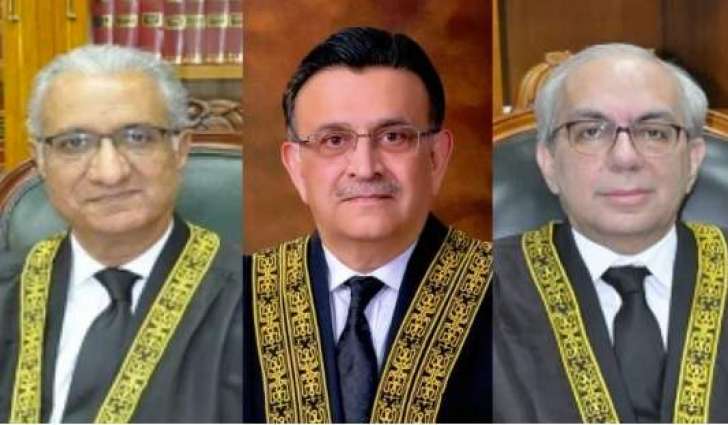The court issued notices to the AGP, President Arif Alvi, the federal government, and the Ministry of Parliamentary Affairs, directing them to appear for the joint hearing on June 13.
ISLAMABAD: (UrduPoint/Pakistan Point News-June 7th, 2023) The Supreme Court (SC) of Pakistan announced on Wednesday that it has adjourned the hearing of the Punjab election review case and the Supreme Court Review of Judgements and Orders Act 2023 until June 13.
The decision came after a three-member bench, led by Chief Justice of Pakistan Umar Ata Bandial, consolidated the Punjab election review case with the Review Order Act case during the proceedings. Justice Ijaz ul Ahsan and Justice Munib Akhtar were the other members of the bench.
Chief Justice Bandial expressed the court's intent to expedite a decision on the Election Commission of Pakistan's (ECP) plea for reviewing the verdict on the Punjab elections. Acknowledging the receipt of petitions, he emphasized the significance of addressing the Review Order Act at the current stage.
Chief Justice Bandial informed that notice would be issued to the Attorney General for Pakistan (AGP), following which the bench would proceed with considering the ECP's review plea under the Review Order Act. In light of this, the Chief Justice invited the views of PTI lawyer Barrister Ali Zafar regarding the Review Order Act.
Barrister Zafar argued against the constitutionality of the SC Review Order Act, asserting that it contradicted the Constitution. He contended that a similar matter had previously been raised in the SC Practice and Procedure Act, which obtained a stay order from the Supreme Court. He asserted that the same stay should be applicable to the Review Order Act as well. Barrister Zafar further maintained that the Supreme Court retained the authority to hear the ECP's review plea as the Review Order Act did not currently apply to the court due to the existing stay.
Justice Akhtar interjected, pointing out that if the Review Order Act were to be enforced, the ECP's lawyer would be required to present arguments before a larger bench. He questioned the feasibility of the Supreme Court proceeding with the Punjab election case if the Review Order Act had been implemented. Additionally, Justice Akhtar sought clarification from the lawyer on why the Review Order Act did not apply to the Supreme Court.
Chief Justice Bandial underlined the widespread desire for a prompt decision on the Punjab election review case. He emphasized that there were limitations to filing an appeal and noted that the ECP's lawyer had argued for extensive authorities. The Chief Justice emphasized that elections were a matter of national importance and implementing the May 14 orders was not practically feasible, although they represented a historical verdict.
Petitioners Zaman Khan Wardag and Ghulam Mohiuddin echoed the arguments presented by Barrister Zafar. They asserted that the Review Order Act was illegal and necessitated a constitutional amendment to expand the jurisdiction of reviews. The court recognized that a stay order had already been issued by a larger bench on the implementation of the SC Practice and Procedure Act. Consequently, the court scheduled a joint hearing for both cases on June 13.
Chief Justice Bandial announced that the Supreme Court would conduct daily hearings on the cases after the aforementioned date. The court issued notices to the AGP, President Arif Alvi, the Federal government, and the Ministry of Parliamentary Affairs, directing them to appear for the joint hearing on June 13.
In regards to the Review Order Act, petitioner Advocate Riaz Hanif Rahi urged the court to declare the Act unconstitutional, null and void, and issued without jurisdiction. The petition named the government as a respondent through the Ministry of Law and Justice Secretary and Senate Secretariat Secretary Muhammad Qasim Samad Khan. The petitioner argued that the law was unconstitutional and had been enacted solely for the government's personal advantage, disregarding the public interest.
Rahi further contended that the respondents had exceeded their constitutional limits by considering extraneous factors and ulterior motives. The Review of Judgements and Orders Act 2023, which came into effect on May 5, 2023, was at the center of Rahi's plea.
Responding to the petitioner's arguments, Law Minister Azam Nazeer Tarar referred to Article 188 of the Constitution and defended the Review Order Act. He stated that the law empowered the Supreme Court, subject to the provisions of any Act of Majlis-e-Shoora and any rules established by the Court, to review its judgments and orders. Tarar emphasized that the legislation was procedural in nature and aligned with the spirit of Article 188 of the Constitution.
Shifting the focus to the Election Commission of Pakistan (ECP), their petition challenging the Supreme Court's authority to set a date for holding elections in Punjab was previously heard.
During the last hearing, Chief Justice Bandial adjourned the proceedings indefinitely after Attorney General for Pakistan (AGP) Mansoor Usman Awan mentioned the review order. The AGP informed the bench that the review order had come into effect, leading to the conclusion of the brief hearing.
In their petition, the ECP argued that according to the Constitution, the power to announce the date for general elections rested with bodies other than the judiciary. They contended that the reviewed order breached the fundamental principle of the separation of powers and was thus unsustainable. Additionally, the ECP asserted that fair conduct of the general elections to the National Assembly in Punjab would not be possible in the presence of an elected government.




